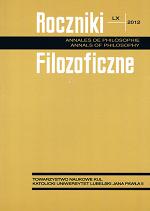David de Dinanto redivivus. Znaczenie badań ks. prof. Mariana Kurdziałka nad Dinantczykiem w kontekście mediewistyki europejskiej
David de Dinanto redivivus. The Importance of Rev. Prof. Marian Kurdziałek’s Research on David of Dinant in the Context of European Medieval Studies
Author(s): Henryk AnzulewiczSubject(s): Philosophy
Published by: Towarzystwo Naukowe KUL & Katolicki Uniwersytet Lubelski Jana Pawła II
Keywords: David of Dinant; Medieval reception of Aristotle in the Latin West; Albert the Great; Marian Kurdziałek; the history of research on David of Dinant
Summary/Abstract: Philosophical ideas of David of Dinant were condemned by the Paris synod in 1210, which were confirmed in 1215 by Cardinal Robert Courçon, papal legate. The main reason of this condemnations was the David of Dinant’s materialistic pantheism. In consequence reading and owning the David of Dinant’s works became punishable by excommunication. A French scholar G. Théry partially developed his ideas according to excerptions of his works largely derived from Albert the Great, Thomas Aquinas and others. A Polish historian Aleksander Birkenmajer found in Ghent (BU 5), Oxford (Bodl. Libr. Digby 67), Paris (BnF lat. 15453) and Wien (ÖNB 4753) libraries the medieval manuscripts containing some fragments of the David of Dinant’s works. Rev. Marian Kurdziahek, a follower of A. Birkenmajer, as the author of the critical edition of David[is] de Dinanto Quaternulorum presented in a new context the early days of the Aristotle’s works reception into Latin culture. Quaternulorum fragmenta edited by M. Kurdziahek served for almost fifty years as an important source of knowledge on David of Dinant. Nowadays, Rev. M. Kurdziahek’s findings are almost fully acknowledged by the contemporary researchers of David of Dinant’s thought.
Journal: Roczniki Filozoficzne
- Issue Year: 61/2012
- Issue No: 3
- Page Range: 53-71
- Page Count: 19
- Language: Polish

